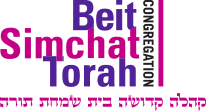
Shavuot and LGBTQ Allyship
What does allyship have to do with accepting the Torah? In short, everything.
Only when the Israelites encamped at Mount Sinai “as one person with one heart” did God say “The time has come for me to give them my Torah.” Likewise, to properly accept the Torah today, we must again unify ourselves through communal responsibility. This year, the holiday of Shavuot coincides with Pride month and as such, it is an especially apt time to reflect on the importance of allyship as part of our spiritual practice.
In Judaism, allyship isn’t reactionary, rather it’s preventative. Allyship is not understood as a response of solidarity in the face of oppressions, but rather as a primary strategy to be in society in its ideal way of being. Our interconnectivity protects the wellbeing of others and is the foundational principle of the Torah.
The Talmud tells the story of a potential convert who comes to Hillel and asks to convert to Judaism on the condition that he is taught the entire Torah while standing on one foot. Hillel responds: דַּעֲלָךְ סְנֵי לְחַבְרָךְ לָא תַּעֲבֵיד — זוֹ הִיא כׇּל הַתּוֹרָה כּוּלָּהּ, וְאִידַּךְ פֵּירוּשָׁהּ הוּא, זִיל גְּמוֹר – What you dislike, don’t do to your friend. This is the entire Torah. Everything else is commentary. Go and learn.”
While the simple interpretation of Hillel’s parting instruction is to go and learn Torah, this is not stated. The implied command is also to learn to understand oneself and one’s neighbor, which requires a reexamination of how one’s own actions have negatively affected others. It is not enough to love someone in your heart. The Torah holds us responsible for the consequences of our actions and inactions on the world around us.
We can understand Hillel’s reframing of the Torah’s obligation to “love another as one loves oneself” as a call to examine one’s own complicity in societal failures. Learning Torah necessitates reflecting on our past choices, and correcting them, as part of the process of acquiring new wisdom.
Many of our communal spaces have not been welcoming to queer or gender queer Jews. Just as we are obligated to examine our deeds before Yom Kippur, and make peace with each other as part of our preparations for the day, we must also approach Shavuot with the same accountability for the negative impact we might have had on others. Anti-trans legislation can only gain traction in the absence of communal clarity that being trans is beautiful and a blessing.
In the seven weeks after Pesach and leading up to the holiday of Shavuot, we mourn the 24,000 students of Rebbe Akiva who perished because they didn’t afford each other proper dignity and respect. The Talmud tells us that they died from an illness that was a punishment for their lack of attachment to the Torah, which was caused by their lack of attachment to each other. Since the Torah was not given to an individual, but to an entire nation, it cannot be properly learned by individuals outside of the greater context, outside of the whole entity of Israel.
Every year on Shavuot, we are reminded that no one has the ability to fulfill all 613 commandments by themself. By connecting to each other, as one person with one heart, we are able to guarantee that the expectation of the Torah, and the needs of humanity are all being met. It is this commitment itself, of being responsible for each other, that grants us the access to the Divine that is reflected in each person.
Tradition teaches that each of us is a letter in the Torah. The only way to understand the Torah, that is sourced in each other, is by taking care of each other. We have the Book of Ruth, which we read on Shavuot, as a result – and to teach us – of the global reward for acts of kindness.
Even the custom of eating dairy on Shavuot invites us to reflect on how we can better use our own resources to help provide for the needs of others. The loving nature of a parent nursing their child is the model for the way that the rabbis see the appropriate transmission of Torah to students. School children are called “tenokot shel beit rabban,” those who nurse from the study hall to reinforce that the way that we learn is an essential part of the teaching.
In the story of the potential convert who asked to be taught the entire Torah “עוֹמֵד עַל רֶגֶל אַחַת – while standing on one foot,” the request can be understood to be a reference to one “רֶגֶל – festival,” namely Shavuot. While we cannot learn the whole Torah on one foot nor during one festival, nor can we repair our society in such a short span of time, Hillel teaches us that when we are willing to start the process of being a better ally, everything can be accomplished. Shavuot is a wonderful time to recommit ourselves to the possibility of positive change. By celebrating the essential role that LGBT+ folks have in Jewish communal life, we advance the cause of goodness in the world, together, for everyone.
